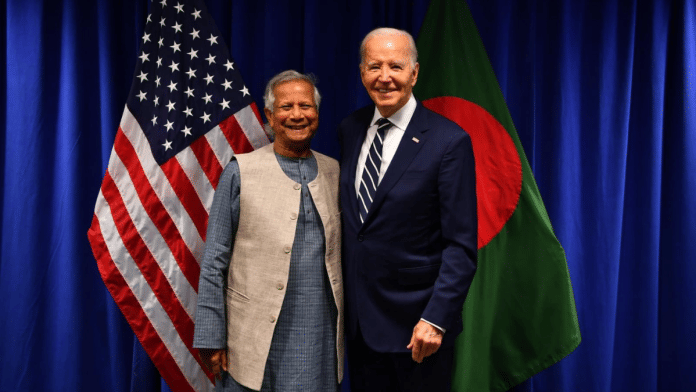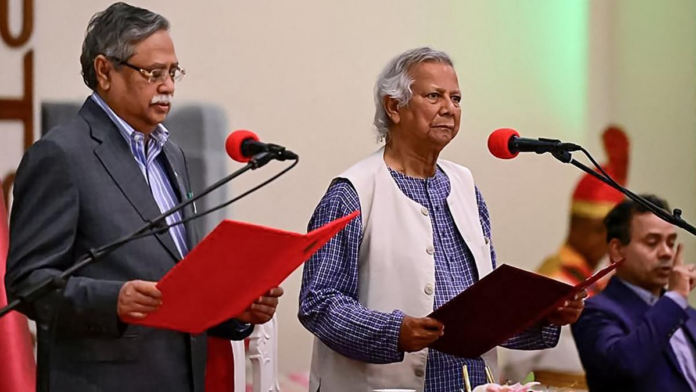In a major diplomatic reshuffle, Bangladesh’s interim government, led by Chief Advisor Muhammad Yunus, has recalled five key envoys from their positions around the globe, including Mustafizur Rahman, the High Commissioner to India. This move follows significant political upheavals in Bangladesh, which saw the resignation of Prime Minister Sheikh Hasina after weeks of intense protests. Hasina has since fled to India for safety, further intensifying the already volatile situation.
Among the envoys recalled, the list includes Bangladesh’s Permanent Representative to the United Nations, Muhammad Abdul Muhit, High Commissioner to Australia M Allama Siddiqui, Ambassador to Belgium Mahbub Hassan Saleh, and Ambassador to Portugal Rezina Ahmed.
The government has instructed the envoys to immediately hand over their responsibilities and return to Dhaka. This decision comes shortly after the recall of Saida Muna Tasneem, the High Commissioner to Britain, signaling a broader shift in Bangladesh’s diplomatic strategy under the interim government.
Who Are the Recalled Envoys?
- Mustafizur Rahman – High Commissioner to India
- Muhammad Abdul Muhit – Permanent Representative to the United Nations
- M Allama Siddiqui – High Commissioner to Australia
- Mahbub Hassan Saleh – Ambassador to Belgium
- Rezina Ahmed – Ambassador to Portugal
This recall is significant as some of these envoys, including Mustafizur Rahman, were nearing retirement in the coming months. The sudden decision to bring them back has raised questions about the future direction of Bangladesh’s foreign policy under Yunus’s interim government. According to a Reuters report, they were asked to relinquish their duties with immediate effect, although no further explanations were provided.
Bangladesh’s Political Upheaval: The Yunus Factor
The decision to recall the diplomats is closely linked to the political turbulence that has gripped Bangladesh in recent months. Muhammad Yunus, a Nobel Peace laureate and an internationally renowned figure for his work in microfinance, took charge of the interim government after a wave of violent protests forced Prime Minister Sheikh Hasina to resign. These protests were fueled by concerns over electoral integrity, economic issues, and growing public dissent.
Hasina’s resignation on August 5, and her subsequent fleeing to India, marked the end of her long-standing leadership in Bangladesh. According to reports, she was airlifted to India in a military helicopter, landing at Ghaziabad’s Hindon air base, before being relocated to an undisclosed safe location, where she currently resides.

What Does This Mean for Bangladesh-India Relations?
The recall of Mustafizur Rahman, Bangladesh’s High Commissioner to India, raises questions about the future of Bangladesh-India relations. India has been a critical ally to Bangladesh, with the two nations sharing a close political, economic, and cultural relationship. Rahman, who had played a key role in fostering these ties, was widely respected for his diplomatic efforts.
The recall, however, comes at a time when India’s geopolitical importance to Bangladesh has arguably never been higher. With Sheikh Hasina currently in India, Bangladesh may be entering a new phase in its foreign policy. There is widespread speculation that Yunus’s government could seek to renegotiate certain agreements or shift its focus towards strengthening ties with other global players like the United States and China.
What’s Next for Yunus and Bangladesh?
As Bangladesh transitions into its interim government under Muhammad Yunus, the country faces several pressing challenges. One of the immediate tasks for Yunus’s administration will be to stabilize Bangladesh’s domestic situation. The violent protests that toppled Hasina were only one symptom of deeper societal issues, including economic hardship and dissatisfaction with governance.
Furthermore, Bangladesh’s international image has taken a hit. The sudden reshuffling of key envoys and the political uncertainty that followed Hasina’s departure have raised eyebrows across the global diplomatic community. Many are watching closely to see how Yunus, with his Nobel laureate background but limited political experience, will navigate these choppy waters.

Future of Bangladesh Diplomacy: Yunus’s Approach
Yunus’s approach to diplomacy appears to be one of restructuring and re-evaluation. With the recall of envoys from major diplomatic posts such as India, the United Nations, and Australia, Yunus may be looking to install officials more aligned with his government’s objectives, which could signal a shift in how Bangladesh positions itself on the global stage.
However, this diplomatic recalibration could come at a cost. Bangladesh has enjoyed strong ties with the UN and key global powers. Any drastic change in its foreign policy approach could unsettle those relationships, potentially affecting trade deals, foreign investments, and regional cooperation, particularly in South Asia.
A Nation in Transition
Bangladesh’s decision to recall five of its key envoys, including Mustafizur Rahman in India, highlights the rapid shifts occurring in the country’s political landscape. As Muhammad Yunus steers the nation through this transitional period, much remains uncertain. The recall of diplomats, along with the resignation and flight of Sheikh Hasina, points to a country in flux, where both domestic and foreign policies are likely to see significant changes in the coming months.
As the world watches Yunus’s next moves, one thing is clear: the future of Bangladesh is far from settled, and the decisions made in this period will have long-lasting implications for its people and its position on the global stage.

